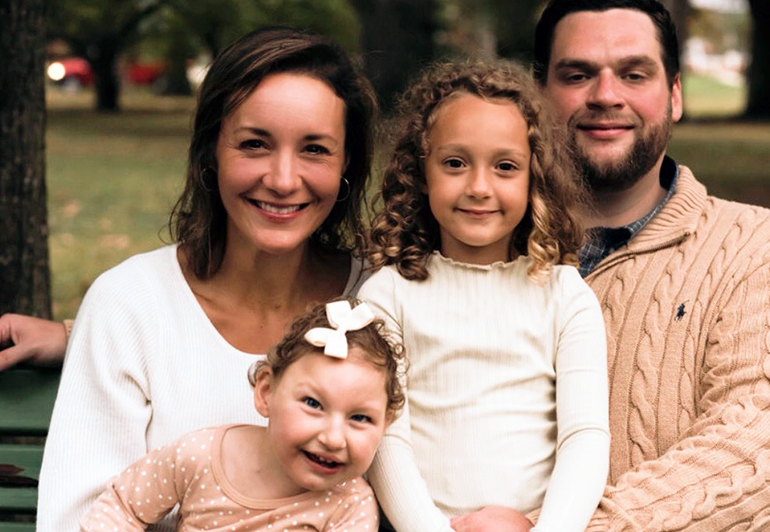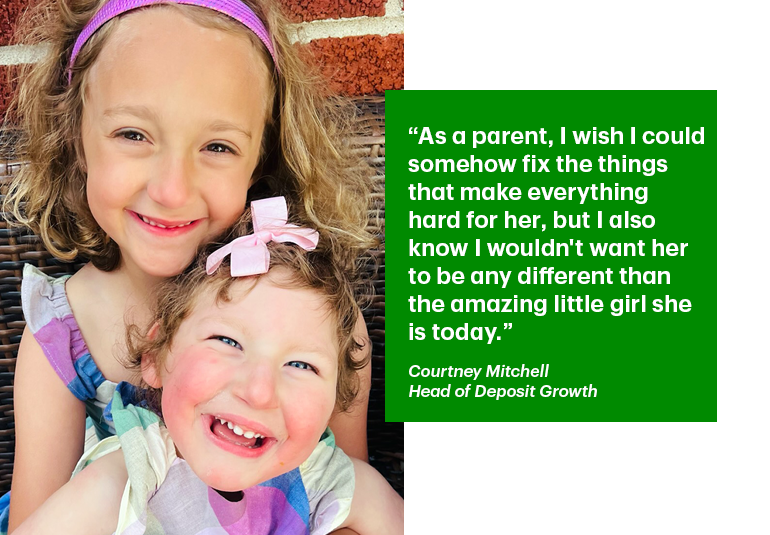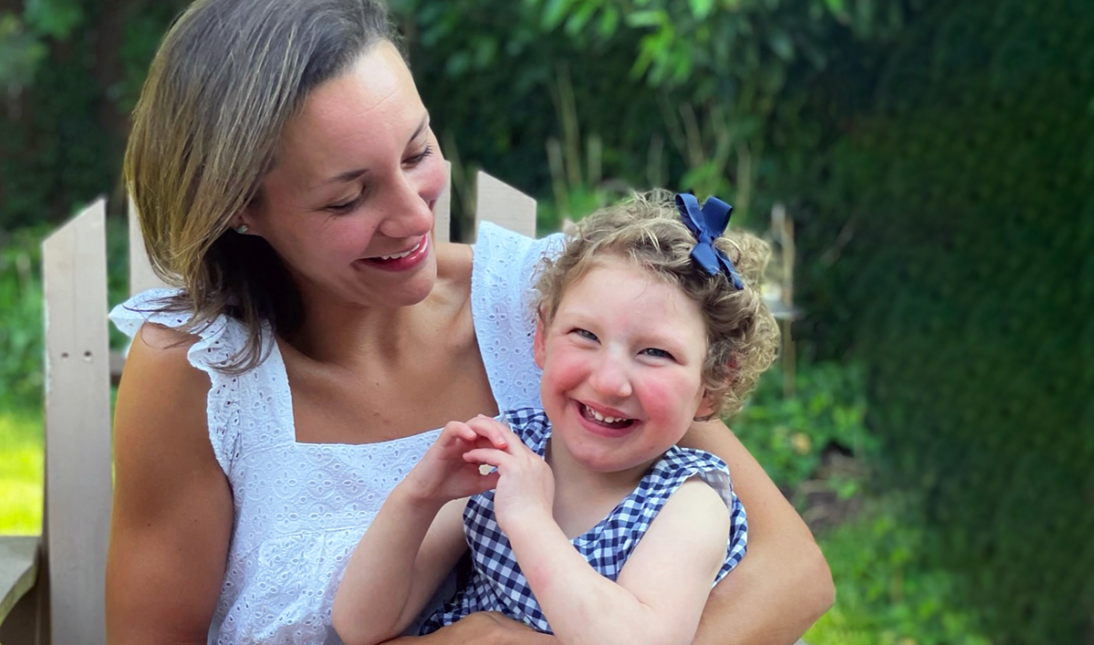Courtney Mitchell is TD Bank's Head of Deposit Growth. The views below are strictly her own.
It was a typical February morning in 2020 until I got the call with the results that would change our family forever.
My six-month old daughter's Evelyn or Ev's brain scan revealed significant growth issues, and that she will likely face a lifetime of physical and mental disabilities.
Since that day, we still don't have a definitive diagnosis or cause despite what feels likes hundreds of doctor appointments and testing. There is a real possibility we may never have an answer. We're slowly learning to be okay with that.
After years of weekly appointments and therapy, I can't check a single box for a three-year-old's development checklist. Ev still can't crawl, walk, or talk, and we're preparing ourselves emotionally for the scenario that she may never do these things. At the same time, we never underestimate her and remain hopeful and focused on helping her get to her full potential, whatever that may be.
While we do not have the medical answers we long for, what we do know for sure is that Ev is the happiest kid you'll ever meet, and she brightens our day and that of anyone lucky enough to be around her. We've learned to find so much comfort in these moments. She's changed everyone she has met for the better. I've had other parents, teachers, doctors, and people I don't even know tell me they look forward every day to seeing her smile and we realize how lucky we are. As a parent, I wish I could somehow fix the things that make everything hard for her, but I also know I wouldn't want her to be any different than the amazing little girl she is today.

Our family journey
This journey our whole family is taking, Ev, my husband, Reed, and oldest daughter, Grace has been filled with both joys I could never have imagined, along with frustrations and sorrows as we go through growing pains of changing our expectations and accepting our new reality.
"Every story shared by a colleague accelerates our progress toward disability inclusion at TD," said, John Pluhowski, AMCB, Chief Communications Officer and Executive Sponsor, Individuals with Diverse Abilities (IwDA). "Courtney's reflections on Evelyn's journey builds allyship, fosters acceptance and drives purposeful change. It takes great courage to take this bold step, and for that, we are all deeply grateful."
For those parents and immediate families facing similar situations, I want to tell our story and some things I wish I had known that hopefully can help them navigate the road ahead.

What I wish I knew back then
- Acceptance is a journey, not a checkbox. When we received the brain scan results, I was so focused on one thing - how do I fix this? The thought that it was permanent and that she couldn't grow out of it was unbearable. It took some time to reach the point where we accepted that no matter what, we couldn't change the fact that she would be different from other children. My focus turned to embracing her differences that make her the amazing and beautiful person she is. She wouldn't be Ev without them.
It is important to know that full acceptance of this reality does not just hit you one day. I still have my ups and downs. I have my good days when I focus on Ev and her happiness, but I have my bad days when I struggle and feel overwhelmed with all the challenges and unknowns that the future holds. What I did notice is slowly the good days outweighed the bad and we remain positive and hopeful. - Recognize the world around you is on the journey with you. I was hesitant at first to open to family and friends about the extent of what was going on because I was exhausted at trying to comprehend it myself. They wanted answers as to why, as did we, and I couldn't give them any. It was an overwhelming feeling of isolation not feeling like I could relate or turn to those closest to me. I have learned to open up to them more and more and have watched how much their own understanding and awareness of disabilities has grown. They eagerly wait for my updates after check-ups, celebrate when they notice she seems stronger, and offer to help in any way they can. We now feel we have this support network behind us and ready to help get us through whatever we have coming.
I would also remind myself that while on the path to opening up, people may unintentionally say hurtful things only because they don't have an awareness of disabilities. Over time, I've learned that the comments are not meant to be hurtful, and it really comes from a lack of understanding and remind myself that three years ago, I could have been the person saying the comment given my lack of knowledge at the time. Now, I focus on using this as an educational opportunity in my response to them. - Recognize the resilience of siblings. It is hard when you think about the potential impact to the sibling when everything is so heavily focused on your child with disabilities. We found ourselves forgetting to celebrate Grace as an individual and the progress she was making as a child without disabilities. To make sure we carve off that time no matter what, we have recurring "Mommy & Gracie" and "Daddy and Gracie" days where it is one on one and all about her. Make sure you answer siblings' questions about the situation but also, to understand it's easy for children to misinterpret messaging. For example, Grace kept hearing that Ev was "special." One day, Grace asked "why is she so much more special than me." That was a learning moment for us. We have turned to specialists like a child psychologist and children's books to help us and her learn more.
The most important thing is to trust your child to go through the same type of acceptance process that we did as adults. Grace doesn't have a problem with Ev's differences. She loves her sister as she is. We asked her recently, "what do you notice is different about Ev?" and her answer was, "she has really short hair", and most importantly, she "loves that she doesn't tattle" on her, which was so telling how she looks past the disabilities her sister has. - Self-care is needed to recharge. I think this is an important message for all parents. You don't want to lose yourself as an individual and at least for me, when I'm recharged, it helps me be at my best for my kids. I still try to take time to do things that I enjoy. My husband and I will sometimes take turns so we can spend time doing things important to us, whether it's time with friends, going for a run, or a round of golf. It takes a lot to balance everything, but it's so important not only to me, but also to our family – that everyone is able to thrive as an individual.
- Advocacy is critical. When we first started on this journey, I almost expected to be given some sort of guidebook or at least be able to "Google" my way through what the next step should be. I learned quickly that is far from the case. There is no one person or reference to tell you what the best next step for your child is and it falls to the parent to be that central point of advocacy. It is an overwhelming feeling at first when you go from managing the routine check-ups and illnesses that go along with any child and add in countless therapies, specialists, and school accommodations to figure out. I am still learning everyday how to be the best advocate for Ev but so far, I have found support with community resources, making connections with other families dealing with similar situations, and through her team of doctors and therapists. You know your child better than anyone so again, trust your parent instincts and push for more when you don't feel it's enough.

